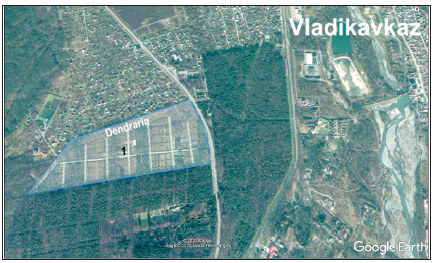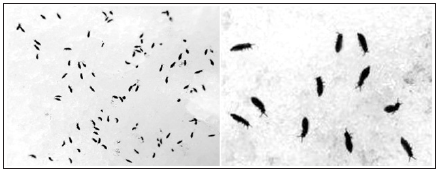- Submissions

Full Text
Clinical Research in Animal Science
About the Clusters of Small Insects Found in Vladikavkaz Dendraria
VV Dobronosov*
National Park “Alania”, Vladikavkaz, Russia
*Corresponding author: VV Dobronosov, National Park “Alania”, Vladikavkaz, Russia
Submission: August 09, 2020;Published: December 14, 2020

ISSN: 2770-6729Volume 1 - Issue 2
Abstract
In February 2020, visitors to the Vladikavkaz Dendraria observed huge clusters of small jumping insects caused by a thaw in the snow. On external signs, they looked like fleas and this circumstance caused fear among visitors. Articles with frightening headlines and reviews appeared in the media. Dendraria employees noted in their publications that these are snow fleas that pose absolutely no danger to humans and pets. This study has been carried out to clarify the situation.
The study area is situated at the southern outskirts of the city of Vladikavkaz. Conventional methods of visual observation and photography of insects in nature and the laboratory, as well as their manual collection, were applied.
It was found that these Snow fleas belong to the Isotomidae family, species-Desoria hiemalis Schött, 1893.
This study is only the first step and it is certainly necessary to continue research on this phenomenon in subsequent years.
Keywords: Vladikavkaz Dendraria; Snow fleas;Springtails; Collembola order; Isotomidae family;Desoria hiemalis
Introduction
In the middle of February 2020, visitors to Vladikavkaz Dendraria were frightened by the emerging clusters of small dark insects, which look like fleas. Publications with frightening headlines appeared in the media, such as “Fleas attack people in Dendraria in North Ossetia” [1]. The publication noted that “local residents told about what was happening, who warned fellow countrymen against going to where insects literally pounce on guests” and “the dendraria is teeming with fleas that jump on adults and children, we recommend residents to refrain from visiting the arboretum”. It was also written that “the townspeople turned to the leadership of the arboretum with a request to carry out sanitary treatment there”. Meanwhile, the comments noted that these are most likely snow fleas, which do not pose any danger to humans [2-4].
This generally accepted concept is called Snow fleas-small insects of the Springtails (Collembola) order, well known to biologists. The length of adults is about 1.5- 2.0mm; the body of insects is covered with small hairs. The habitat of these fleas is reservoirs and glaciers of the middle strip of Europe and the Middle East.
According to literary data https://www.e-osetia.ru/news/2665183/sneznye-blohibezopasny- dla-lubitelej-progulok-po-vladikavkazskomu-dendrariu “they are absolutely harmless and are not parasites, unlike the usual fleas [5]. They live at a temperature of -10 to +10 °C. That is why they are not attracted by the heat of the human body: its temperature is too high for them”. In order to clarify the situation finally, this study was carried out [6].
Method
The study area is situated at the southern outskirts of the city of Vladikavkaz, the central point 1 (Figure 1) has the coordinates: 42°58’49.22” N, 44°39’39.50” E, 791 m above the sea level (WGS-84). It is the Vladikavkaz dendraria (arboretum).
Figure 1: The study area, 1-the central point. Source: Author’s own draft based on Google Earth screenshot.

Vladikavkaz arboretum is a botanical reserve of regional significance (number in the Register 1510150) in the city of Vladikavkaz. Located in the Terek river valley, within the urban borders in the south-west of residential urban areas at the foot of Lysaya Mountain. Total area-150.9 hectares. It was founded in 1982. More than 200 species of plants grow in the arboretum, including rare introduced and relict. Coniferous trees grow in the central part. The grassy tier is represented by thick-wall and sedge communities. Fern associations grow in areas with excessive humidification. Along the main alleys and outbuildings are lawns with dusty, spit and mint communities. The grass cover is regularly carved.
In order to study found insects, visual observation techniques and their photography were applied, as well as the manual collection of biomaterial for subsequent laboratory study. A Sony DSC-H300 digital camera was used for photography, and a binocular microscope MBS-1 was used for laboratory research. The definition of imago was carried out using the Fjellberg A determinant [7].
Research Result
During the study, 10 photographs were taken, and 20 specimens of live insects were caught. Fragments of some clusters are given in the photos (Figure 2).
Figure 2: Cluster of snow fleas increased fragment

A study of the characteristic features of the insects’ structure (Figure 3) and their comparison with the features described in the Fjellberg A determinant [7] showed that they belong to the Isotomidae family, species-Isotoma hiemalis Schött, 1893. To date, the classification has changed slightly, and this species has been assigned to the genus Desoria Nicolet in Desor, 1841. Accordingly, now this species is called Desoria hiemalis Schött, 1893.
Figure 3: Desoria hiemalis. General view. Head. Pads. Paunch.

Discussion and Conclusion
According to literature, the general distribution of the species is Northern and Central Europe, it is the mesophilic forest species inhabiting bedding, soil and mosses [8]. In certain periods Desoria hiemalis (Schött, 1893) reached the level of dominance or subdominance in inundated forests of the middle taiga [9]. Despite the fact that the Vladikavkaz arboretum was created artificially, some of its plantations are very reminiscent of natural forests and taiga (Figure 4a&4b) and it is very likely that outbreaks of this species occurred during favorable periods of various years.
Figure 4: Some plantations of arboretum. Deciduous plantings [10]. Coniferous plantings [11].

The arboretum is dominated by group planting of the following species of woody plants: Fraxinus excelsior L., Robinia pseudoacia L., Acer platanoides L., Acer pseudoplatanus L. They have a height of up to 18m, with a trunk diameter of 30 to 60cm. In addition, Quercus rubra L. is common, having a trunk diameter of up to 70cm and a height of up to 20m, Quercus rober L., Philodendron amurensis Rupr., Fagus orientalis Lipsky and many others. In the central part there are plantings of conifers. Along the alleys grow Chamaeciparis lavsoniana (A. Murray) Parl., Picea pungens Engelm., Picea abies (L.) Karst., etc.
On the published messages, snow fleas appear regularly in North Ossetia (https://stav.aif.ru/dontknows/opasny_li_snezhnye_ blohi_popadayushchie_na_odezhdu_v_dendrarii_vladikavkaza). Perhaps the townspeople simply encountered them for the first time and scored a panic. Our study is only the first step and it is certainly necessary to continue research on this phenomenon in subsequent years.
References
- Berg E (2020) Blohi atakuyut lyudej v dendrarii v Severnoj Osetii (Fleas attack people in dendraria in North Ossetia).
- https://ru.wikipedia.org/wiki/Vladikavkaz arboretum
- http://www.zapoved.net/index.php/katalog/regiony-rossii/severo-kavkazskij-fo/severnaya-osetiya-alaniya/Владикавказ/8490-Vladikavkaz arboretum
- https://stav.aif.ru/dontknows/opasny_li_snezhnye_blohi_popadayushchie_na_odezhdu_v_dendrarii_vladikavkaza
- https://www.e-osetia.ru/news/2665183/sneznye-blohi-bezopasny-dla-lubitelej-progulok-po-vladikavkazskomu-dendrariu
- https://news.myseldon.com/ru/news/index/224091796
- Fjellberg A (1979) Revision of the European species in the Isotoma olivacea-group (Collembola: Isotomidae). Insect Systematics & Evolution 10(2): 91-108.
- Kaprus IJ, Shrubovych JJ, Tarashchuk MV (2006) Catalogue of the Collembola and Protura of Ukraine. Lviv p. 81.
- Taskaeva AA, Lapteva EM (2012) Collembola community dynamics in inundated forests in the middle taiga. Povolzhskiy Journal of Ecology 4: 431.
- http://www.zapoved.net/index.php/katalog/regiony-rossii/severo-kavkazskij-fo/severnaya-osetiya-alaniya/Владикавказ/8490-Владикавказский_дендрарий
- https://www.neizvestniy-geniy.ru/cat/photo/peyzaj/1195978.html?addLike=-1
© 2020 VV Dobronosov. This is an open access article distributed under the terms of the Creative Commons Attribution License , which permits unrestricted use, distribution, and build upon your work non-commercially.
 a Creative Commons Attribution 4.0 International License. Based on a work at www.crimsonpublishers.com.
Best viewed in
a Creative Commons Attribution 4.0 International License. Based on a work at www.crimsonpublishers.com.
Best viewed in 







.jpg)






























 Editorial Board Registrations
Editorial Board Registrations Submit your Article
Submit your Article Refer a Friend
Refer a Friend Advertise With Us
Advertise With Us
.jpg)






.jpg)














.bmp)
.jpg)
.png)
.jpg)










.jpg)






.png)

.png)



.png)






